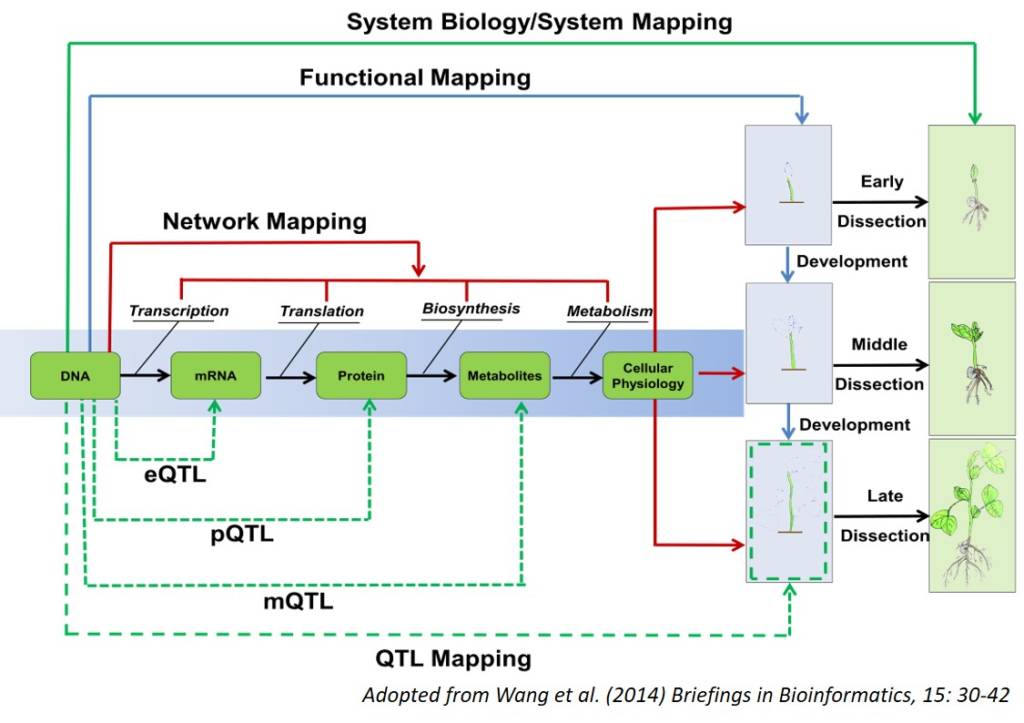Trait biology for enhancing precision and efficiency of crop breeding: Realizing the urgent need to understand how thousands of loci contribute to complex trait like higher yield under drought/rainfed conditions, heterosis/hybrid vigour, Aflatoxin resistance, etc. the System Biology Theme will be providing a multi-disciplinary platform (mainly under the Centre of Excellence in Genomics & Systems Biology, see later) for different Themes. At present, different Themes at ICRISAT are working on the same topic but limited exchange of the information happens between/ across the Themes. The Theme will be catalysing interactions amongst scientists from different Themes working on one topic through quarterly/ half-yearly meeting so that a better coordination (instead of asking any Theme/ scientist to stop the work) can be established and a given trait can be understood in much more comprehensive manner. The Theme Systems Biology, in no way, will restrict any Theme or scientist to work on a particular topic. The Themes on the other hand will bring colleagues working in silo together and can offer an inter- and multi- disciplinary platform.
In order to get insight into how the genes/alleles of different genes interact with each other or with environmental factors to produce a phenotype, it is important to harness multiple levels of component trait information. A Systems Biology approach allows analysis of molecular interactions to understand genetic architecture and intermediate physiological phenotypes. Most of the complex traits result from a combination of genotype, environmental and management factors (G X E X M interactions). The frequency and nature of G X E X M interactions can be studied using global integration of transcripts, proteins, and metabolites level (Figure 1). To uncover novel relationships and regulatory interactions, data-driven network construction methods use various algorithms. These algorithms are based on different regression models and information theories. Integration of genetic information and network modelling will be helpful to identify the genes/alleles and pathways that are likely to be crucial factors in biological processes.
This Research Module will have extensive interaction/collaboration with Themes: Cell, Molecular Biology & Genetic Engineering, Genomics & Trait Discovery, System Analysis for Climate Smart Agriculture, Integrated Crop Management of RP-Asia, RP-ESA and RP-WCA of ICRISAT and other partners. In summary, this Research Module will harness multiple levels of component trait information to dissect the genetic and biology of economically important complex traits like heterosis, drought tolerance, salinity tolerance, heat tolerance, etc. Mathematical models will be utilized to predict higher order relationship between molecular phenotypes, which will help to understand how these multiple components interact with each other and influence complex traits. The proposed thorough understanding of the molecular basis of complex traits should be very useful for enhancing precision and efficiency of crop breeding programs in RP- Asia, RP- ESA and RP- WCA of ICRISAT and NARS partners.
Expected Outcomes:
- Understanding of molecular mechanism of agriculturally important complex traits linked to agricultural productivity.
- Identification of key genes, proteins and pathways involved in input use efficiency, biotic and abiotic stress resistance, heterosis, and nutrient mobilization.
- Diagnostic genes/ markers for deployment in forward breeding and crop improvement.

